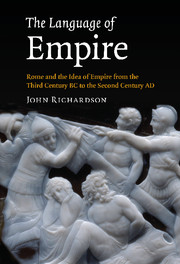 The Language of Empire
The Language of Empire Published online by Cambridge University Press: 01 October 2009
The victory of Octavian over Antonius and Cleopatra at Actium in 31, and still more the process, beginning in 28 and culminating in the reordering of his powers and, on 16 January 27, the conferral by the senate and people of the name Augustus marked a change which was rapidly known throughout the Roman world and which altered for ever the nature of the Rome's empire. It was inevitable that so great a change in the distribution and the management of the provinciae and the concentration of imperium in the hands of one individual would affect the ways in which the words were used, and such language in turn reveals a different way of thinking about empire, certainly when compared with the patterns we have seen in Cicero, but even with the more ‘imperial’ ideas of Pompeius. In this chapter it is these shifts in meaning, or rather the addition of meanings, of imperium and provincia which will form the centre of attention, and in particular any evidence for the use of imperium in a geographical sense, of ‘empire’ rather than ‘power’.
AUGUSTUS AND THE RES GESTAE
The obvious place to start such an investigation is with Augustus himself in the record he himself left in the Res Gestae. By the end of the reign of Augustus, it is clear that the change for which we are searching had come about. In the Res Gestae the princeps refers to the closing of the gates of the temple of Janus and writes that the intention of the ancestors had been to close them ‘[cum p]er totum i[mperium po]puli Roma[ni terra marique es]set parta vic|[torii]s pax’ (‘when through the whole imperium of the Roman people by land and sea peace had been gained by victories’).
To save this book to your Kindle, first ensure no-reply@cambridge.org is added to your Approved Personal Document E-mail List under your Personal Document Settings on the Manage Your Content and Devices page of your Amazon account. Then enter the ‘name’ part of your Kindle email address below. Find out more about saving to your Kindle.
Note you can select to save to either the @free.kindle.com or @kindle.com variations. ‘@free.kindle.com’ emails are free but can only be saved to your device when it is connected to wi-fi. ‘@kindle.com’ emails can be delivered even when you are not connected to wi-fi, but note that service fees apply.
Find out more about the Kindle Personal Document Service.
To save content items to your account, please confirm that you agree to abide by our usage policies. If this is the first time you use this feature, you will be asked to authorise Cambridge Core to connect with your account. Find out more about saving content to Dropbox.
To save content items to your account, please confirm that you agree to abide by our usage policies. If this is the first time you use this feature, you will be asked to authorise Cambridge Core to connect with your account. Find out more about saving content to Google Drive.